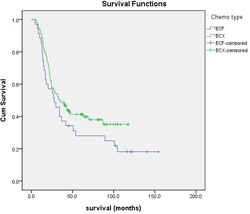|
Back to 2014 Annual Meeting Posters
Survival Following Neoadjuvant Chemotherapy in Esophagogastric Cancer: Evolving Improvements and Survival
Sam Starnes*2, Kruti Shah2, Michael P. Lewis1,2
1Upper GI surgery, Norfolk and Norwich University Hospital, Norwich, United Kingdom; 2School of Medicine, UEA, Norwich, United Kingdom
Introduction: Neoadjuvant chemotherapy has been introduced for treating stage II and III esophagogastric cancer, but there is little data on differing chemotherapies and its impact on cancer staging and resection rates. As incidence increases in the developed world, individual regimes need to be assessed for their effect on survival.
Aim: To examine the effect of changes in chemotherapy from 5FU based infusional chemotherapy (ECF) versus capecitabine chemotherapy on survival rates following diagnosis.
Method: A retrospective analysis was performed of all patients who underwent neoadjuvant chemotherapy for stage II and III oesophagogastric cancer at a single UK cancer centre between 2000 and 2010. Survival analysis was performed comparing two groups: prior to introduction of capecitabine (ECF) and following its introduction (ECX) using Kaplan Meier and differences between groups compared using log-rank.
Results: Between Jan 2000 and Feb 2010 a total of 145 patients underwent neoadjuvant chemotherapy for esophagogastric cancer. Of these 35 received 5FU infusion based chemotherapy (group 1) prior to 2004 and 110 received capecitabine based chemotherapy (group 2). Resection rates were 94.3% for group 1 and 95.5% for group 2. Median survival improved from 27.8 months for group 1 to 34.8 months for group 2 (3 year survival 37% versus 48%) although this was not statistically significant (p=0.15)
Conclusion: The change in neoadjuvant chemotherapy resulted in a non-significant improvement in median survival for patients with esophagogastric cancer. The work needs to be repeated in large cohorts to clarify if a true difference exists, although the data suggests capecitabine may be more efficacious.
 Kaplan-Meier curve showing survival of patients with stage II/III esophagogastric cancer by type of neoadjuvant chemotherapy Kaplan-Meier curve showing survival of patients with stage II/III esophagogastric cancer by type of neoadjuvant chemotherapy
Back to 2014 Annual Meeting Posters
|


